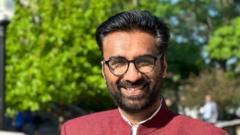Article text:
Badar Khan Suri, an Indian scholar specializing in conflict studies, is currently facing deportation from the United States following his arrest on March 17 due to alleged terrorism-related charges. The incident dates back to an invitation from a classmate 15 years ago, which led him to participate in an aid convoy to Gaza, a trip that would significantly shape his career and personal life.
During the 2010 expedition, which included over 150 people from various Asian nations, Mr. Suri encountered Mapheze Saleh, a Palestinian and daughter of a former Hamas adviser. The couple's relationship blossomed, resulting in marriage shortly afterward. After a decade in India, they migrated to the US, where Suri became a postdoctoral fellow at Georgetown University, living in Virginia for the past three years.
His life took a dramatic turn when federal authorities arrested him. Shortly afterward, Tricia McLaughlin from the Department of Homeland Security tweeted that Suri was being detained due to his "close connections to a known or suspected terrorist." Suri has publicly denied these allegations, and despite legally entering the US on a student visa, a court has so far halted his deportation.
This development is set against a backdrop of a broader crackdown by former President Donald Trump's administration on undocumented immigrants and activists involved in pro-Palestinian protests, which some authorities have claimed to contribute to rising antisemitism, given Hamas's designation as a terrorist organization in the US. Contrastingly, India has historically supported the Palestinian cause whilst also fostering closer ties with Israel.
Friends and colleagues of Mr. Suri in India have expressed disbelief at the terror allegations, portraying him as a dedicated academic rather than someone with unlawful affiliations. His professors have emphasized that expressing views on conflicts aligns with the responsibilities of a conflict studies scholar and noted that Suri's involvement was academic, not militant.
Those who participated in the convoy recall Mr. Suri as a thoughtful and secular thinker during their discussions. The trip was a pivotal educational journey for him, allowing him to observe the realities of conflict in Gaza firsthand. Following the convoy, he was motivated to support humanitarian efforts in the region, primarily focusing on assisting vulnerable populations.
Suri and Saleh’s wedding was noteworthy and celebrated in India, where the couple lived before relocating to the US. Saleh, a US citizen, was actively involved in aid work in Gaza prior to their marriage.
As Suri's father expressed profound concern for his son, asserting that his only "sin" was marrying a Palestinian woman, there remains hope within his family that he will not face deportation. They believe that the accusations are unfounded and lack substantial evidence.
Badar Khan Suri, an Indian scholar specializing in conflict studies, is currently facing deportation from the United States following his arrest on March 17 due to alleged terrorism-related charges. The incident dates back to an invitation from a classmate 15 years ago, which led him to participate in an aid convoy to Gaza, a trip that would significantly shape his career and personal life.
During the 2010 expedition, which included over 150 people from various Asian nations, Mr. Suri encountered Mapheze Saleh, a Palestinian and daughter of a former Hamas adviser. The couple's relationship blossomed, resulting in marriage shortly afterward. After a decade in India, they migrated to the US, where Suri became a postdoctoral fellow at Georgetown University, living in Virginia for the past three years.
His life took a dramatic turn when federal authorities arrested him. Shortly afterward, Tricia McLaughlin from the Department of Homeland Security tweeted that Suri was being detained due to his "close connections to a known or suspected terrorist." Suri has publicly denied these allegations, and despite legally entering the US on a student visa, a court has so far halted his deportation.
This development is set against a backdrop of a broader crackdown by former President Donald Trump's administration on undocumented immigrants and activists involved in pro-Palestinian protests, which some authorities have claimed to contribute to rising antisemitism, given Hamas's designation as a terrorist organization in the US. Contrastingly, India has historically supported the Palestinian cause whilst also fostering closer ties with Israel.
Friends and colleagues of Mr. Suri in India have expressed disbelief at the terror allegations, portraying him as a dedicated academic rather than someone with unlawful affiliations. His professors have emphasized that expressing views on conflicts aligns with the responsibilities of a conflict studies scholar and noted that Suri's involvement was academic, not militant.
Those who participated in the convoy recall Mr. Suri as a thoughtful and secular thinker during their discussions. The trip was a pivotal educational journey for him, allowing him to observe the realities of conflict in Gaza firsthand. Following the convoy, he was motivated to support humanitarian efforts in the region, primarily focusing on assisting vulnerable populations.
Suri and Saleh’s wedding was noteworthy and celebrated in India, where the couple lived before relocating to the US. Saleh, a US citizen, was actively involved in aid work in Gaza prior to their marriage.
As Suri's father expressed profound concern for his son, asserting that his only "sin" was marrying a Palestinian woman, there remains hope within his family that he will not face deportation. They believe that the accusations are unfounded and lack substantial evidence.





















